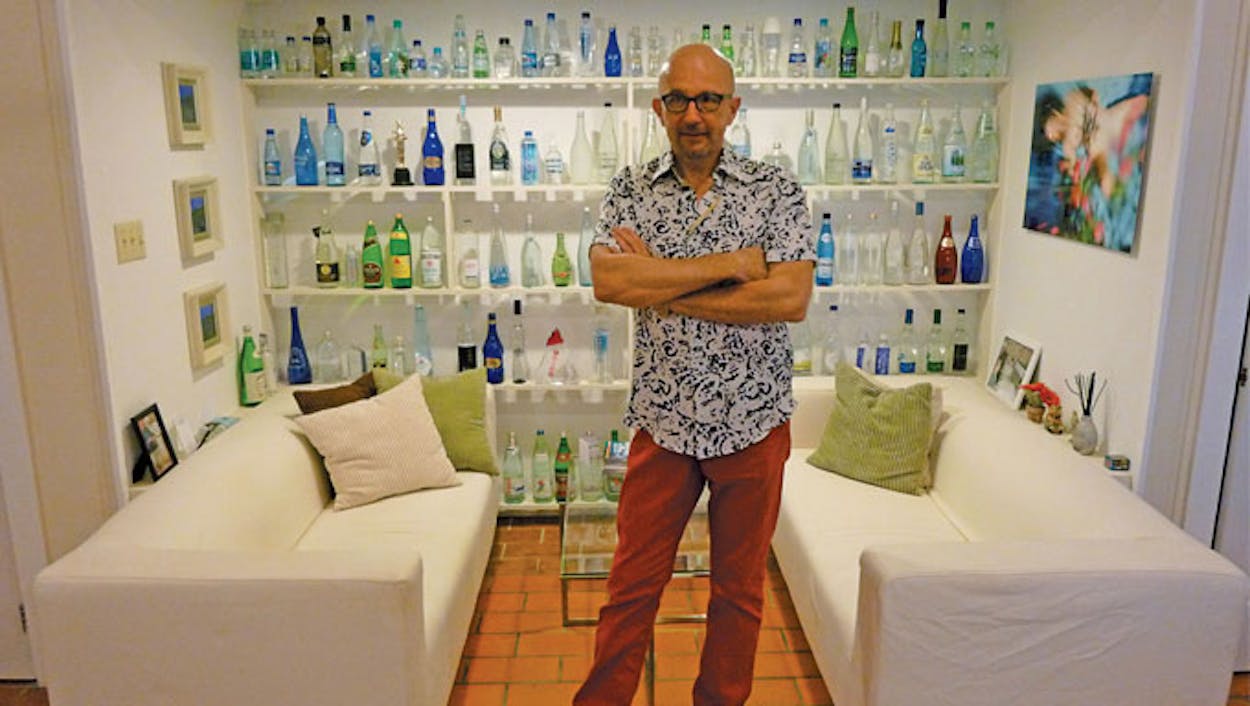When a doctor told Michael Mascha, a wine connoisseur, that he could either live or continue to drink, it wasn’t an easy choice.
“I hesitated,” he recounted recently at his home in Harlingen, “because I had just bought some nice bottles of Krug Champagne.” But Mascha eventually reconciled himself with a heart defect that barred him from alcohol and found another beverage to explore with his sophisticated palate: water. In the decade since, Mascha has become a high-profile figure in the growing bottled-water industry. FineWaters.com, an online encyclopedia of bottled water that he started in 2002, connects consumers with bottlers of premium water around the world.
Martin Riese, a water sommelier at Ray’s and Stark Bar at the Los Angeles County Museum of Art, calls Mascha a water guru and one of the top water experts in the world.
Mascha makes little money from his online venture, which sells a glass he designed and his book but not water. Instead, he is engaged in a constant advocacy. His claim: Water, with its variations in taste, terroir and provenance, is worthy of earnest consideration.
“I have about a 98 percent conversion rate,” Mascha says of skeptics. Treat anyone to Tasmanian Rain, a clear Australian water, and ROI, a Slovenian mineral water so dense with magnesium that the chemical element settles to the bottom of a glass, and the difference is undeniable.
Mascha recalls an encounter in 2007 with Time magazine columnist Joel Stein. “My publicist back then said, don’t do it,” Mascha said. “He’s just out to get you.”
It turned out that he was.
“I have an inherent hatred of bottled water,” Stein said, recalling the encounter. “It just feels fake and privileged.”
But he was won over. Mascha was “so very smart and very charming,” he said. “And he’s very earnest—yet not unaware of the dandyishness of what he does.” In Stein’s self-referencing column, “The Making of a Water Snob,” he wrote that in talking to Mascha he “got excited about the water I had come to humiliate.” When Mascha first turned his attention to water, the field lacked reliable metrics for assessing taste, he said. In the past, the experts would “tell you in twenty sentences what they’d feel when they’d drink each water, and it sounded really amazing,” Mascha said.
“The only problem is that if they were to do the same thing in a blind tasting,” he added, “they would have come up with something different.”
Mascha differentiates between premium waters using measurable categories. Mineral content is the major contributor to water’s taste. There is also balance, the level of infused carbon dioxide; orientation, the water’s pH level; hardness, the amount of calcium and magnesium in the water; virginality, the water’s nitrogen content; and vintage, which can range from days to thousands of years.But Mr. Mascha is interested in more than just taste. “Like wine,” he says, “it’s not only the characteristics you can perceive but the story.” In pursuit of story, he has traveled to Greenland to harvest iceberg water in a tiny boat.
But not all great waters need to come from halfway around the world. For a top-quality Texas label, Mascha recommends Crazy Water from Mineral Wells, which got its name from a nineteenth-century woman of questionable mental health, who found the town’s heavy mineral water curative.
Mascha’s own story is already several acts deep. After a childhood in Vienna (Lavaca County), Mascha became interested in the anthropological study of food. He lived for years with his wife, Erika, in Fiji, filming documentaries, after which he taught visual anthropology at the University of Southern California, working with the primatologist Jane Goodall, among others.
An encounter with the pre-Netscape Internet, in 1993, took him in another direction. He was co-founder of a successful information-technology company that was hit hard by the 2000 tech industry crash. So he founded another—and cashed out in 2006. Then he left Los Angeles.
For Harlingen, though? The quality of the area’s salt-water fly fishing was a big draw, as was the low cost of living. His friends in California thought he was crazy for moving here, and so, for that matter, did residents of Harlingen.
“At the beginning, nobody asked us where we were from. We thought that was kind of strange,” he said. “Then we discovered that for the longest time, people thought we were in the witness protection program.”
But Mascha quickly grew to love the area. He makes an effort to show off Harlingen to those in the world of premium water, many of whom have come to Mascha’s headquarters, a ranch-style house on more than an acre of tropical gardens. He has become a prominent figure in the community. The Maschas started Harlingen’s first farmer’s market, and Mascha has exhibited some of his nude photography at the city’s museum.
For Mascha, his ability to run FineWaters out of Harlingen while growing it to international prominence is a marvel of the internet age. FineWaters recently added its first employee in Shanghai, where the demand for luxury goods, including bottled water, is exploding. Of course Mascha could cash in on that demand, selling water through FineWaters. But he’d rather remain a connoisseur.
“I have unbelievable fun,” Mascha said. “I’m traveling the world. I’m eating in good restaurants. I’m telling people interesting stories about waters they’ll enjoy. It’s not a bad life.”
- More About:
- Water








